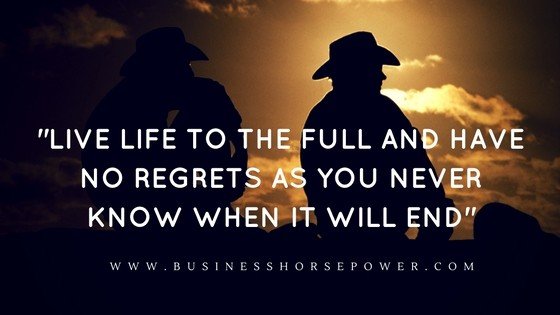
by Julia Felton | Aug 24, 2016
Are you living a life of no regrets? No seriously, are you. What do you have on your bucket list of things to do that you’ve been putting off either because of lack of time and/or resources? Maybe it’s a business idea that you haven’t pursued to its natural conclusion, maybe it’s a location you want to travel to or maybe it’s a hobby you haven’t taken up yet. All too often in life we put off things saying I’ll do that when I’m older, have more money etc and yet what happens if this time never arrives. I don’t want to go out of this world wishing there were things I had done, but failed to do because of fear, lack of resources or my failure to take action.
The phrase a life of no regrets is something I’ve coined from a mentor of mine Deri Llewellyn-Davies (aka The Strategy Man). Deri was inspired to live a life of no regrets after listening to the parting words of his father. Since that time Deri has been an adventurous daredevil climbing many of the words highest mountains. He was even on Mount Everest when the earthquake struck last year. You can listen to his incredible story in his TedEx talk F*** the Fear.
This year my own mortality has been brought sharply into focus as I’ve lost two good friends (very unexpectedly) and as my mum goes through cancer treatment again. My good friend Jacqs who terribly passed away after a car crash last weekend certainly lived life to the full. She was always the life and soul of the party and designed her life the way she wanted to – she lived life on her terms. I first met Jacqs when I was working at Andersen and she offered me a refuge when I split with my boyfriend. We had a wild time living together in London as she knew how to have fun. And it is Jacqs that I have to thank for my current business and lifestyle as she persuaded me to go on a ranching holiday with her back in 2000 and that re-ignited my passion for horses and then the eventual purchase of Toby my first horse.
Jacqs was committed to designing and living her life her way. After our time wrangling as cowgirls in Wyoming she decided she wanted to go and live in the US. Within a year she had managed to get her employer Deutsche Bank to transfer her to their New York office and she moved there just after 9/11. I’ll fondly remember that Christmas sitting in her New York apartment surrounded by packing boxes.
Then she decided she wanted to live in Montana. So blow me down that is what she does. She buys a property there and then persuades Deutsche Bank she can work remotely and in the process she gets promoted to Deutsche Bank’s Global Head of Supervisory Analysts. On paper you would never have imagined such a global firm would allow such a senior position to work remotely, let alone in Montana, and yet that is what happened. If she had allowed her logical brain to determine what was possible she might never had tried to make her dream come true. But Jacqs was resilient, steely, determined and tenacious and never had any doubt that this outcome was possible.
So what restrictions are you putting on your life? Where are you holding back and not doing what you want because you think it’s not possible. Jacqs is an example to us all that if you really desire something you can achieve it, however impossible it might initially seem.
Go forth and be the designer of your own life and share in the Facebook group what you want you life to be like, so that we can all support you on your journey.
Julia Felton (aka The Business Wrangler) is the founder of Business HorsePower. Business leaders, entrepreneurs and executives hire her to accelerate their business performance by harnessing the energy of their people to work more collaboratively together. By aligning purpose with actions the team achieves exponential results as everyone starts pulling in the same direction.
Julia believes that business is a force for good and through designing purpose-driven businesses that leverage the laws of nature, and the herd, you can create businesses founded on the principles of connection, collaboration and community that make a significant impact in the world.

by Julia Felton | Aug 17, 2016
Have you ever considered that your success is determined by the attitude of the people you spend the most time with? Just think about that for a moment. If you surround yourself with successful positive people it stands to reason that you too will gravitate to their level.
We have witnessed this phenomenon during the Olympics and none more so than on Sensational Sunday, when the UK won 5 gold medals. The best result for the team in any Olympics held abroad. What is even more amazing about the feat is that two of the gold medals occurred in gymnastics, a sport that the UK has never won a gold medal in before.
Over the last decade, led by Louis Smith, the sport has grown in popularity and attracted new talent in the shape of Max Whitlock – who went on to win two gold medals. Part of Whitlock’s success is in no small part to the trailblazing that Louis did for the sport and the fact that he won a silver medal in the 2012 Olympics and a bronze in the Beijing Olympics.
We’ve also witnessed similar success in the Velodrome where the success of an initial handful of riders has rubbed off on the team and at the time of writing this the UK has secured 4 gold medals and 3 silver medals in the cycling events. An incredible feat again considering that two decades ago the sport was barely visible in the UK.
I experienced my own mini-version of how surrounding yourself with successful people helps you up your game and become more successful when I was out running on Sunday. At one point during my run a lady overtook me as I was coming down the hill near my house. She then proceeded to run past me continuing on the same track that I was planning on following. There was something about following her (or was I chasing her!) that helped me up my game and go much faster than usual. The result was that I covered the longest distance I have ever done in 30 mins and not surprisingly in the fastest time.
Personally I was really amazed at the impact that her presence had had on me and how it had helped me improve my performance beyond what I thought I was capable of. And that’s the power of surrounding yourself with people more successful than you. They can help you achieve levels that you may have previously thought were impossible. They encourage you to reach for the stars and be your best as they model what is possible.
So who are you surrounding yourself with? Are they people that will help propel you and your business to the next level, or are they folks who are doubting you, putting you down and quashing your dreams.? Recognising this is the first step in helping you change your environment to one that is more positive and supportive to your growth.
I really look forward to hearing about what changes you make as a result of reading this weeks Wednesday Wisdom.
Julia Felton (aka The Business Wrangler) is the founder of Business HorsePower. Business leaders, entrepreneurs and executives hire her to accelerate their business performance by harnessing the energy of their people to work more collaboratively together. By aligning purpose with actions the team achieves exponential results as everyone starts pulling in the same direction.
Julia believes that business is a force for good and through designing purpose-driven businesses that leverage the laws of nature, and the herd, you can create businesses founded on the principles of connection, collaboration and community that make a significant impact in the world.
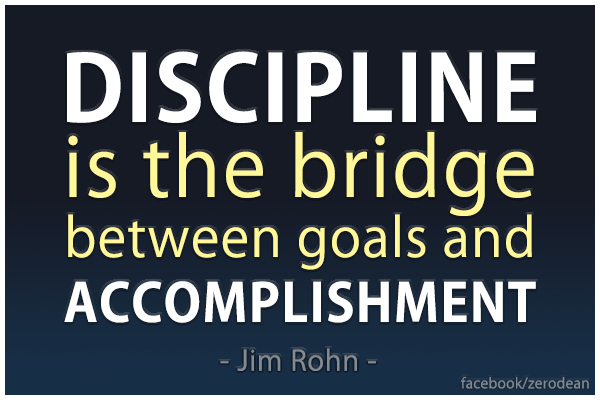
by Julia Felton | Aug 14, 2016
Joined Up Business Leaders are disciplined to ensure that they never waste any resources – time, energy or money. They recognise that when they are disciplined and do what they said they would do, everything in life flows more easily.
Discipline comes from being committed to an activity and seeing it through to the end, no matter what. Far too many people say they are committed to something but when push comes to shove they quit. So why is this? Quite simply whilst they were just interested in achieving something rather than being committed to its success..
Here are three simple actions that you can practice every day to ensure that you stay disciplined and use your resources wisely.
1. Run the day, or it will run you. Some people will be masters of their time, and others will be servants. Joined Up Business Leaders become the masters of their time.
To master your time, you must have clear written goals for each day that you keep with you at all times. It helps to create each day’s list the night before. Prioritize your goals for the day and constantly review them. Enterprising people don’t let the minor activities distract them from the major activities—the ones that hold the keys to their success. Joined Up Leaders are disciplined in how they approach their day and remain pro-active rather than re-active to daily events.
2. Don’t mistake activity for productivity. You probably know some people who always seem to be busy being busy. To be successful, you must be busy being productive. Some people are going, going, going, but they’re not making much progress. Don’t mistake activity for productivity, movement for achievement. Evaluate the hours in your days and see if there is wasted time that you could manage better. You can read more about being a busy fool here.
One of my favourite exercises is to track what you do everyday for a week. I tracked my activities by the hour but you could do it in 15 mins or 30 mins increments. List all the activities that you do during the day, including eating, exercising, sleeping etc. Then at the end of a week calculate how many hours you have spent doing each activity. I was shocked by how much time I was spending on social media and researching what my peers were doing. No wonder time seemed to be slipping past each day. I was in busyness but not really being productive.
3. Focus. The third key is good concentration. You’ve got to zero in on the job at hand and let nothing stand in your way and distract you from the task. It is also important to focus on your highest producing activities first. High income producing activities are those that will immediately yield you income and typically involve connecting with potential clients and prospects. There is no better use of your time than to be investing in activities that leverage your time.
Another way to stay focused is to set a timer and give yourself say 50 mins to complete the task. During this 50 min time make sure that you turn off your phone, email notifications and stop all distractions. There is something very motivating about knowing that you just have a finite amount of time to complete the task at hand. Then at the end of 50 mins you can take a break, re-focus and then start again. I’ve found this strategy to be really successful in helping me get things done.
I’d love to hear what strategies you are using to stay focused so that you can remain disciplined and boost your profits.
Julia Felton (aka The Business Wrangler) is the founder of Business HorsePower. Business leaders, entrepreneurs and executives hire her to accelerate their business performance by harnessing the energy of their people to work more collaboratively together. By aligning purpose with actions the team achieves exponential results as everyone starts pulling in the same direction.
Julia believes that business is a force for good and through designing purpose-driven businesses that leverage the laws of nature, and the herd, you can create businesses founded on the principles of connection, collaboration and community that make a significant impact in the world.
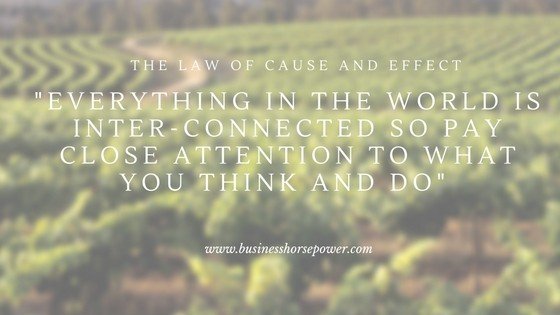
by Julia Felton | Aug 10, 2016
This weeks Wednesday Wisdom has been inspired by David Neagle who mentors many of the world’s leading coaches. I first met David in Arizona two years ago when I heard him speak on how to break through your income glass ceiling. I was impacted by his straight talking and practical approach to business, yet with a very real understanding of the universal laws and how nature impacts all that we do.
This week David reminded me of the importance of Universal Law No 6 – The Law of Cause and Effect. In essence this law states that for every action there is a re-action or an impact, so if you are not getting the results that you want you need to examine what you are doing. How are you causing the results you are getting.?
Specifically every effect you see in your outside or physical world has a very specific cause which has its origin in your inner or mental world. This is the essence of thought power. Every one of your thoughts, words or actions sets a specific effect in motion which will come to materialize over time. To become the master of your destiny, you must master your mind for everything in your reality is a mental creation. Know that there is nothing like chance or luck. They are simply terms used by humanity in ignorance of this Law.
Therefore, if you desire more income and that is not manifesting then maybe you are not taking enough action and you are not congruent in really wanting this. Maybe you need to be having more sales conversations, meeting more people or writing more compelling sales copy etc. The universe is always giving us feedback so it is important to listen to this and then review what is happening.
Be really honest with yourself at this point. Where are you holding yourself back and not fully engaging in the process? What are you resisting doing that if you did would change the trajectory of your business. We all have areas of resistance, its only human. Just acknowledge these and then in the words of Susan Jeffers “feel the fear and do it anyway”. It is through accurate action that you impress your desire on The Universe so that it can provide what you desire.
My horses are great levelers at providing me with feedback and again this week eloquently demonstrated the law of cause and effect working. Recently I have been spending a few days a week in London with a client, and so the horses have not been getting as much time from me as usual. They are clearly unimpressed and so have been re-dressing the situation by getting in all kinds of scrapes resulting in some minor injuries and breaking through the electric tape in the field. Of course when these things happen I am forced to spend more time with them treating their ailments and re-fencing the field.
The great thing is that I now know when they feel they need some more TLC and so can adjust my schedule to provide them what they need. This is why I spent all Saturday with them. It was a lovely day, very relaxing which is also what I needed.
So this weeks question is how is the law of cause and effect impacting your results. What do you need to do differently and what do you need to embrace in order to get the real outcome that you truly desire?. As always let me know in the Facebook group.
Until next time I wish you amazing Unbridled Success in all you do
Julia Felton (aka The Business Wrangler) is the founder of Business HorsePower. Business leaders, entrepreneurs and executives hire her to accelerate their business performance by harnessing the energy of their people to work more collaboratively together. By aligning purpose with actions the team achieves exponential results as everyone starts pulling in the same direction.
Julia believes that business is a force for good and through designing purpose-driven businesses that leverage the laws of nature, and the herd, you can create businesses founded on the principles of connection, collaboration and community that make a significant impact in the world.

by Julia Felton | Aug 3, 2016
Today’s Wednesday Wisdom has been inspired by my horses as we have been involved in a number of near “misses” over the last few weeks, which could have gone spectacularly wrong and had a very different outcome if the horses hadn’t stayed calm when their emotions got high.
Charlie was the first to demonstrate the importance of staying calm in a crisis because what tends to happen is that when our emotions get high – through either fear or joy – then our rationale brain can stop working and we forget to think logically about what is happening, and as a result intelligence goes down.
At this time of year the grass has been growing quite fast so some areas of the horses paddock are fenced off with electric tape to prevent them entering the area. Within my two fields I had an area that needed reseeding so I had put up some electric tape (although it wasn’t electrified) to enable the grass to grow.
As I went into the field to get the horses for an event with a private client I saw Charlie had his head over the electric tape in an attempt to get the lush grass on the other side. Immediately, however I saw the problem. He had also managed to step over the bottom electric tape meaning that the tape was between his front feet. As I entered the field he stepped backwards but forget to lift his front foot up. The result was that the electric tape was wrapped round his foot.
I saw the panic rise in his eyes and calmly I told him to stand still. There was a urgency and directness in my tone and bless him he stood still so I could try and remove the tape. The challenge was the tape was so taut that I could not release it. (Now I know why cowboys carry knives!). It was exasperating trying to figure out a way to help him. In that moment I had to keep my emotions in check so that I could use all my intelligence to help find a solution to release him. The obvious solution would be to get him to walk forward and so slacken off the rope but Charlie was literally sitting on the floor with all his weight pulling against the rope. Luckily I managed to pull up some of the posts which gave me enough slack to get the rope off his foot. What a relief.
Charlie suffered a mild rope burn to his fetlock, just above his hoof, but when I think what could have happened we were so lucky. Charlie clearly demonstrated that in a difficult situation he could contain his emotions and trusted me enough to allow me to help him. He kept his intelligence in the face of adversity.
Bracken too has had her fair share of challenges over this last week. The first was during a demo I was holding for a group of local business owners. As we often do we start with a herd observation exercise where the group observe the horses and figure out which horses they are most drawn to and why. The horses were in the arena and as usual there were a number of obstacles in the arena for use in other exercises were doing that morning.
As we observed the herd Bracken decided that it would be a great idea to go and rub her backside on a jump wing that was holding up a pole. Everyone was laughing at her as she played her usual joker role and entertained the crowds. Not unsurprisingly the pole fell to the ground. No worries there but then the terror came over me at what happened next. Bracken has a really big, bushy tail and in rubbing her butt on the jump stand she got the jump cup that the role rests on stuck in her tail. So as she moved away from the jump post she dragged it with her. My heart leapt to mouth as I knew the consequences of what could happen. If Bracken panicked and started running she would think she was being chased by the jump stand and all hell could let loose. Thankfully again I called to Bracken to stand still and she did. Then as I approached she started moving but thankfully the jump cup became disentangled from her tail and fell away. Another serious accident – one none of us could have foreseen – averted.
Contrast this with her sheer joy this morning at being able to get into the field with lush grass. As some of you might remember from my previous post Sometimes You Need A Different Perspective, the horses currently have to really think to find the exit from their field. This morning Bracken and Toby couldn’t figure out that they needed to retreat 50 metres into the field to get onto the other side of some other electric fence so they could and then get out the field. So I went and caught Bracken and Toby and led them back into the field so I could lead them out into the lush grass. As we turned the corner Bracken immediately realised she could get the lush grass. It was just 50 metres ahead of her. What she forget in her sheer excitement was that she had a halter on and I was on the end of the rope. In that moment of her emotional high all her intelligence left her as she decided to try and run away and the dance on two back feet!. Not very clearly. I calmly asked her to stand still and dropped my energy so as to calm her. She stood still but when we started to walk she decided to run again. I asked her to stop and we stood still. It took a long time to reach that lush grass simply because in her excitement she had lost all perspective and intelligence and forgotten how to behave.
So my question to you today is how do you respond when things don’t go to plan?. Do you panic and forget any logical reasoning as your intelligence drops or can you regulate your emotions, stay calm and react in methodical way.
I love how my horses are always teaching me new things and this week I learnt how I can stay calm in an emergency and respond in a measured way that keeps everyone safe. I also learnt how by calming my energy I can help my horses manage their emotions. Plus I also love how much my horses trust my judgment in these challenging situations and know that I am there to help them.
As always share your thoughts with me on facebook or email me and let me know how this post has impacted you and you can put into place what you have learnt in the workplace.
Wishing you a flow filled week.
Julia Felton (aka The Business Wrangler) is the founder of Business HorsePower. Business leaders, entrepreneurs and executives hire her to accelerate their business performance by harnessing the energy of their people to work more collaboratively together. By aligning purpose with actions the team achieves exponential results as everyone starts pulling in the same direction.
Julia believes that business is a force for good and through designing purpose-driven businesses that leverage the laws of nature, and the herd, you can create businesses founded on the principles of connection, collaboration and community that make a significant impact in the world.
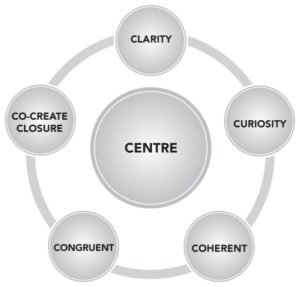
by Julia Felton | Jul 31, 2016
When challenged with having a difficult conversation many people simply do not know how to approach the situation. This is why I have developed a framework that I call the 6 C’s To Successful Courageous Conversations to provide you with a road map for navigating the conversation. Being able to have courageous conversations is a key skill of being a Joined Up Leader and I share more on this in my book The Alchemy Of Change.

Centre
It is key that you stay in charge of yourself, your purpose and your emotional energy throughout any courageous conversation. Breathe, centre and notice when you become off centre and choose to return to centre again.
This is where your power lies. By choosing the calm, centred state, you’ll help the person you are speaking with to be more centred, too. Centring is not a step centring is how you are as you take the steps. Grounded and in the moment.
Step #1: Clarity
Be clear on the reason for the conversation and the outcome that you desire. Most courageous conversations falter because there is a lack of clarity about the real issue. Get to the root cause and focus on this matter rather than the symptoms that might be showing.
Consider how the behaviour you are addressing is impacting the team and the business. Remember this is not about you, so ensure that you control your emotions and approach the conversation in such a way that you do not contaminate it with unconscious feelings or mixed body language. (For most people this means doing some preparation work in anticipation of the courageous conversation).
Step #2: Curiosity
Cultivate an attitude of discovery and curiosity. Pretend you don’t know anything (you really don’t) and learn as much as possible about the other person and their point of view. Pretend you’re entertaining a visitor from another country, and find out how things are for them in that place; how certain events affect the other person, and what their values and priorities are.
Watch for their body language and listen for unspoken energy as well. What do they really want? What are they not saying? Let the person talk until they are finished. Don’t interrupt except to acknowledge. Whatever you hear, don’t take it personally. It’s not really about you. Learn as much as you can in this phase of the conversation. You’ll get your turn, but don’t rush things.
Step #3: Coherent
Coherent means showing that you’ve heard and understood. Try to understand the other person so well you can make their argument for them. Then do it. Repeat back to them what you heard so you can ensure you fully understood what they said. They will not change unless they see that you see where they stand. Acknowledge whatever you can, including your own defensiveness if it comes up. Acknowledgment can be difficult if we associate it with agreement., however keep them separate. Saying, “this sounds really important to you,” doesn’t mean that you’re going to go along with their decision but it does make the other person feel listened to.
Step #4: Congruent
When you sense the other person has said all they want to then, it’s your turn. What can you see from your perspective that they’ve missed? Help clarify your position without minimizing theirs. Seek clarity from the other person on how they came to the conclusion they did. And why that was not what you intended.
Step #5: Co-create Closure
Now you’re ready to begin building a new solution. Brainstorming and continued curiosity and inquiry are really useful here. Ask the other person what they think might work. Whatever they say, find something you like and build on it. If the conversation becomes adversarial, go back to inquiry. Asking for the other’s point of view usually creates a sense of safety and encourages them to engage. If the other person feels they are being listened to and can shape the outcome they are more likely to feel inspired to offer so solutions
I urge you to use this framework for any difficult conversations that you need to have rather than sticking your head in the sand and avoiding the issue and hoping it will go away.
Communication is essential in business and the latest 2015 Employee Engagement Trends Report by Quantum WorkPlace reveals that one of the biggest areas of uncertainty for employees remains the fact that there is not often honest and open communication with managers. So simply by addressing this issue head on, you should start to see trust and employee engagement levels increase.
Julia Felton (aka The Business Wrangler) is the founder of Business HorsePower. Business leaders, entrepreneurs and executives hire her to accelerate their business performance by harnessing the energy of their people to work more collaboratively together. By aligning purpose with actions the team achieves exponential results as everyone starts pulling in the same direction.
Julia believes that business is a force for good and through designing purpose-driven businesses that leverage the laws of nature, and the herd, you can create businesses founded on the principles of connection, collaboration and community that make a significant impact in the world.

by Julia Felton | Jul 29, 2016
A few years ago the guru’s at Google set out to determine what makes a high performing team. Now we all know how great Google is at finding patterns in data series but the reality is that after years of research and analyzing 150 teams they came to the conclusion that simply there was no pattern. Initially they had believed that putting the best people on a project would get the best results but this simply was not true.
So what ensures that a team is high performing?
The Google executives frustrated with the lack of patterns in the data they collected, the researchers delved further into reviewing past academic studies on how teams work. In the literature, they discovered that psychological and sociological research kept using the term “group norms” when describing successful groups. Norms are the traditions, behavioral standards and unwritten rules that govern how we function when we gather. It was becoming clear that the most effective teams had ‘group norms’ that added to their success.
The challenge that the Google researchers now had was figuring out which ‘group norms’ were the most valuable. With further research, the group norm that emerged as one of the most powerful was ‘psychological safety’.
‘Psychological safety’ has been described by Harvard Business School professor Amy Edmondson as a ‘‘shared belief held by members of a team that the team is safe for interpersonal risk-taking.’’ “A sense of confidence that the team will not embarrass, reject or punish someone for speaking up,’’ Edmondson wrote in a study published in 1999
How to create Psychological Safety
Creating a psychologically safe environment for a team needs to be spearheaded by the leadership in the developing stages of a team. This is the reason that leaders play a more significant role in creating effective teams than the people who make up the team. I certainly know this to be true from my own experience. Some of the best teams I have been part of have been led by inspiring and compelling leaders. People who have been really inclusive and have led by example. People who have created an environment in which we have all felt valued, included and safe to share. A place where we can be authentic and be ourselves. A place were we don’t have to worry about putting on a our game face but rather can show up as our true self, devoid of any masks.
Leaders need to allow for the creation of an emotional safety net to develop within their teams. One way to create this environment is to carve out time for people to actually share their feelings and not just updates on the latest reports or budget numbers.
Leaders can take the time at weekly meetings to start by asking how people are feeling and why. The first few times these conversations happen, it will be beneficial if the leader shares first to set an example of the level and type of information to be shared. In one example from Google at an offsite retreat with a newer team, the leader started off the conversation telling his team that he had cancer and the effects it was having on his life. This opened the doors for in-depth sharing from the rest of the team.
As a leader showing up as authentic and vulnerable can really set the tone for the group and encourage others to open up and so have courageous conversations without fear of reprisals. (You can learn about the 6 C’s to Courageous Communication here). Being vulnerable goes a long way in developing strong trust bonds and trust is the basic building block of teams.
Julia Felton (aka The Business Wrangler) is the founder of Business HorsePower. Business leaders, entrepreneurs and executives hire her to accelerate their business performance by harnessing the energy of their people to work more collaboratively together. By aligning purpose with actions the team achieves exponential results as everyone starts pulling in the same direction.
Julia believes that business is a force for good and through designing purpose-driven businesses that leverage the laws of nature, and the herd, you can create businesses founded on the principles of connection, collaboration and community that make a significant impact in the world.
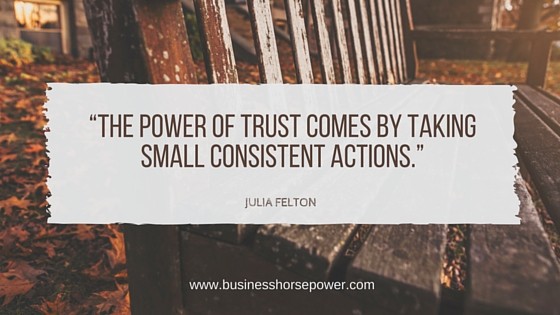
by Julia Felton | Jul 27, 2016
Today I want to talk about the importance of building trust with those you work with. Trust is that elusive quality that fundamentally impacts all aspects of our lives. It is easy to lose and difficult to gain but can be impacted by the power of small.
In his book The Speed of Trust, Stephen R. Covey describes the first wave of trust as self–trust. It is all about being credible and developing integrity, intent, capabilities and results that make you believable, both to yourself and others.
Building trust with yourself starts with the small things in life: doing what you say will do. For example, being on time to meet friends, not finding excuses for cancelling just because you don’t feel up to it, putting personal appointments in your diary and then making sure you keep them (e.g. going to the gym).
I know from my own experience how difficult it can sometimes be to keep those appointments with myself. It is so easy when the alarm goes off in the morning to find an excuse for not exercising today, or not getting up and writing my book. Over these last few months it has taken courage and determination for me to set aside time to start my running. Sure, there is always something else pressing to do, but I know that every time I fail to keep these commitments to myself I feel my self-esteem and self-confidence slipping away and I fail to inspire others to believe in me. They lose trust in me and
the net result is that my business suffers.
It is the small things we do that ultimately impact how people trust us. We might not realise it, but telling a white lie here and failing to keep an appointment there all impact our credibility. And if we are not credible then we are not trustworthy; people simply don’t believe that we will follow through on our actions. We lack integrity when we fail to keep our own standards, and when we fail to live up to our own standards our colleagues see no reason to meet them, either.
BUILDING TRUST WITH SMALL ACTION
Beaver Trees and Landscaping, a small company based in Christchurch New Zealand provides a perfect example of a company that has fully embraced the power of building trust by small actions. Given the nature of its business the company has many client appointments to quote for work.
So after hearing about the Power of Small from Paul Dunn of B1G1, the owner Bryce Robb implemented a policy of making all the appointments for quotations at unusual times, such as 10:25am. This was such a small change to the business but it had massive impact.
Firstly, customer’s surprise at the times of the appointments prompted them to be on time; they were then delighted when the Beaver Trees representative turned up on time. In fact, people are so surprised that they are often found waiting on their driveway for the representative. Now, of course, the Beaver Trees representative is always on time and just this simple act has built massive trust with prospective clients. The net result is that the company’s sales conversion rate has jumped to a massive 80% and they are not the cheapest game in town.
This proves the power of making a commitment and sticking to it. Furthermore, the company was recently judged to be the Best Company To Work For In the World with under 50 team members.
That’s the power of building trust by doing what you say you will do. That’s the power of small.
So what small action will you take today to start building trust with your team, stakeholders and customers? Let me know.
Julia Felton (aka The Business Wrangler) is the founder of Business HorsePower. Business leaders, entrepreneurs and executives hire her to accelerate their business performance by harnessing the energy of their people to work more collaboratively together. By aligning purpose with actions the team achieves exponential results as everyone starts pulling in the same direction.
Julia believes that business is a force for good and through designing purpose-driven businesses that leverage the laws of nature, and the herd, you can create businesses founded on the principles of connection, collaboration and community that make a significant impact in the world.
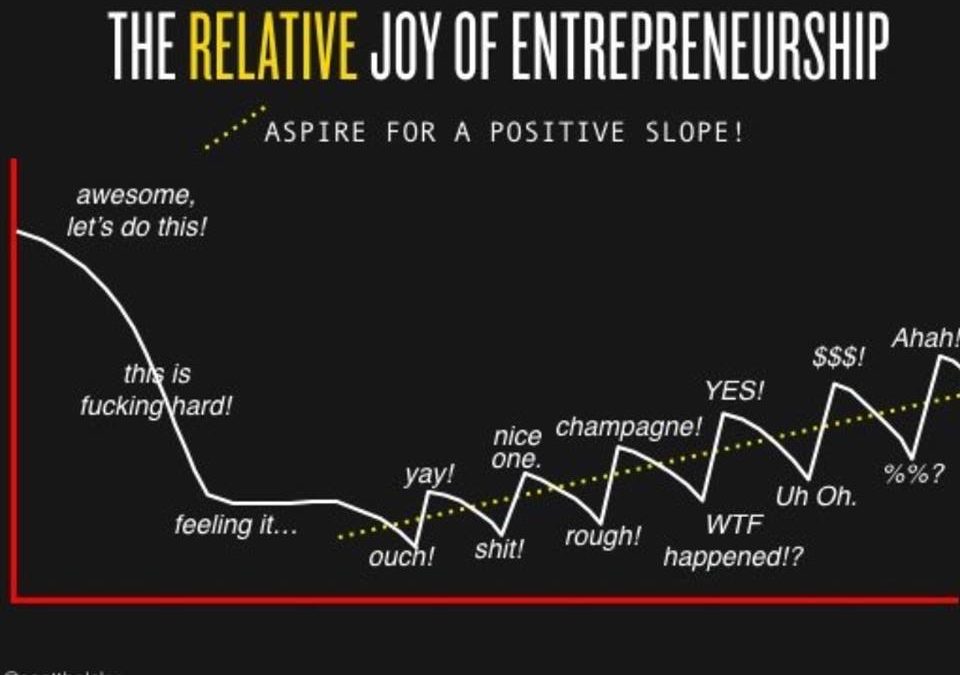
by Julia Felton | Jul 20, 2016
The last few weeks have seen some major shifts happen in the UK and that has left many feeling very uncertain as to the future. It’s natural to feel anxiety when we don’t know what is happening, however, this is a trend that I see happen more and more frequently as the world that we live in never stays still. It changes at lightening pace.
Who had ever heard of Pokemon Go two weeks ago and yet now it is a worldwide phenomenon. I even read about how it triggered a road rage incident in Yorkshire! No-one could have predicted this and whilst we can’t control the rapid change happening around us we can control how we respond to the situations that confront us.
And that’s the same with the entrepreneurial journey. The one certainty is that when you become an entrepreneur your business will have ups and downs and it is how we respond to the down times that ultimately determines our success.
Typically when we launch our business we are ecstatic and highly motivated. We are excited and that passion and excitement spills out into everything we do. The people around us get excited too. Then inevitably, at some point, something doesn’t go to plan and we become disheartened. This is the time that many people give up, complaining things are too hard. But if you stick at it then things start to improve and you get on a high again, only later to have those feelings dashed. This is the roller coaster of business. A continual ebb and flow of highs and lows.
The important thing to focus on at these times is how you rebound because just like the ocean the tide comes in and goes out and so does the success of your business. This is the law of rhythm. And if you think about most of nature has an ebb and flow to it. The flowers grow in the Spring, bloom in the summer and the rest and die off in the winter. The seasons all have an rhythm too. Even your heartbeat has a rhythm. And the rhythm is required to allow time to rest and recuperate.
So if your business is feeling like it is in an ebb right now, don’t fret. Take a deep breathe, focus on what you can control and remember that in time things will improve if you just stick with it.
I know from my own entrepreneurial journey there have been many highs and lows, and whilst the lows can feel overwhelming at times, I know they build resilience and that in time, if I learn from the situation, my business will bounce back and be stronger than before.
So how can you embrace the rhythm of your business and allow this to support your success rather than hinder it?
I wish you an amazing sunshine filled week.
Julia Felton (aka The Business Wrangler) is the founder of Business HorsePower. Business leaders, entrepreneurs and executives hire her to accelerate their business performance by harnessing the energy of their people to work more collaboratively together. By aligning purpose with actions the team achieves exponential results as everyone starts pulling in the same direction.
Julia believes that business is a force for good and through designing purpose-driven businesses that leverage the laws of nature, and the herd, you can create businesses founded on the principles of connection, collaboration and community that make a significant impact in the world.
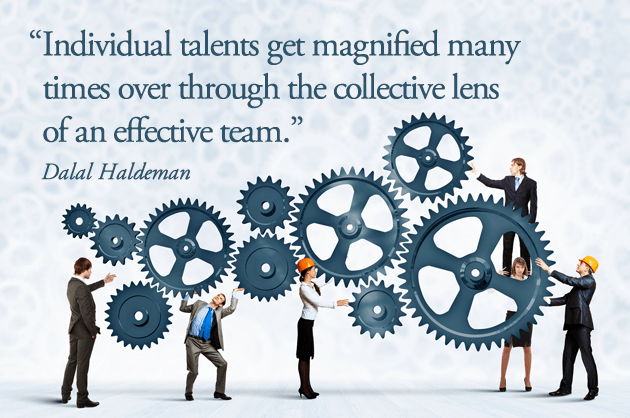
by Julia Felton | Jul 17, 2016
In today’s fast paced society the need for teamwork is paramount. We live in an era where the current leadership paradigm is changing. No longer do the command and control structures that typified the industrial era serve us. There is a need for more collaboration and co-operation and the need to establish agile teams that can respond to rapidly changing circumstances that business find itself in.
An incredible 92% of respondents to Deloitte’s Human Capital Survey 2016 noted that organizational culture needs to change and the power of teams is on the rise, but what exactly is a team as opposed to a collective of individuals.
A team is defined as simply as a group of individuals united in pursuit of a common mission or goal, often sacrificing personal agendas for the sake of team accomplishment. It is the fact that the group have a common mission that makes them a team.
In today’s complex world teams enable us to get stuff done. In addition teams also have:
- More fun
- Provide competitive advantage
- Improve productivity and profitability
- Enhance the business identity
Furthermore teamwork builds trust and trust build speed which decreases costs and profitability. In his book The Speed of Trust Stephen M.R. Covey notes that “Trusted companies outperform their competitors by 10x”
Having led and also been a part of many teams during my lifetime I believe that there are 5 essential habits that any team must have to be highly effective and successful.
1) Shared Leadership
Leadership is no longer the bastion of just those at the top and everyone within the team needs to be a leader of sorts. Increasingly, if we look to the natural world teams often contain two leaders who work harmoniously together for the good of the team. Take a herd of wild horses for example. At the front is the lead mare who sets the pace and direction that the herd will take whilst at the rear of the herd is a stallion who drives momentum from behind and matches the pace set by the leader. From this position they can immediately see what is happening and course correct as needed.
2) Clarity of Purpose
Teams work best in a compelling context when they have a shared vision. The more urgent and meaningful the rationale for the team the more likely it is to live up to its performance potential. Team members need to ‘believe in the cause’. If they can’t, they won’t be prepared to sacrifice their own interests in the interests of the team.
This is summed up well by John F. Kennedy who noted that “Effort and courage are not enough without purpose and direction”. You can put the best group of people together but unless they are united behind a shared purpose it is likely that they will just spin around, never achieving their potential or your business goals.
Naturally of course the team goal needs to be aligned to the organisational goal for maximum impact. I remember when I was volunteering at an Elephant Human Relations Aid (EHRA) in Namibia that the purpose of the organisation was to reduce conflict on the ground between elephants and humans. When the group of volunteers went out into the bush our goal was to build strong stone walls around the water wells to protect the water wells from destruction by the elephants and so mitigate any conflict between the locals and the elephants. Our specific goal was to build the stone walls but the reason we were doing it was aligned to the purpose of the company.
3) Open and Honest Conversations
For teams to be effective everyone needs to feel heard and be able to express an opinion. It is this honest dialogue that helps teams achieve more than the sum of the parts. Through honest conversations new ideas are created and innovation ensues. In fact the worst problem in a team is a team member that does not speak with and does not participate because in teamwork, silence isn’t golden; it’s deadly.
One of the reasons for encouraging full participation in the team is that it allows everyone to articulate clearly what outcome they’re seeking. It’s surprising how often team members assume they’re talking about the same thing when in fact they’re talking past one another. For example, if your discussion is about growth some may be referring to revenue, others to market share, and others to net income. Open, honest communication quickly brings these differences to the fore.
When open and honest communication is avoided it encourages team members to join the dots themselves invariably resulting in the wrong conclusion being made. And in my experience open and honest conversations sometimes don’t take place because we are concerned with how the other person will react. We need to become like horses and after we receive feedback go straight back to grazing and stop carrying around any attachment and negativity to what the other person said.
4) Understand Your Strengths and Values
Know yourself and what you bring to the table. Teams work best when everyone is working to their strengths and the team is in flow. There are no egos in an effective team, everyone values the contribution of each other – whatever the size.
An unclear division of responsibilities or a poor understanding of roles makes it impossible for the team to fully exploit its performance capacity. Lack of clarity in this area can lead to communication problems, disputes over matters of competence or responsibility and increased stress. These in turn reduce engagement , productivity and innovation
A great example of this in the African Bush is the Dung beetle. They are often ignored when people go on safari as they are so small and clearly not so impressive as the Big Five. However the dung beetle has an invaluable job in the bush as he cleans up the 50kg of dung that is released every day by the elephants. The dung beetle rolls the dung into a ball, lays his eggs in it and then buries it. Clearly a really important role in the ecosystem of the bush. Just Imagine what would happen if they went on strike!
5) Trustworthiness and Transparency
Great teams are built on trust and it is this that enables the honest conversations to occur and for the team to leverage the strengths of its team members. No group ever becomes a team until it can hold itself accountable as a team. At its core, team accountability is about the sincere promises we make to ourselves and our team mates; promises that underpin the two other critical aspects of effective teams: commitment and trust.
Teams enjoying a strong common purpose and approach inevitably hold themselves responsible, both as individuals and as a team, for the team’s performance. This is essential for high performance, but impossible without high levels of trust.
So are you engaging in these five habits of highly effective teams? Is your team working to its maximum potential? If not spend some time working on these five areas and watch the exponential explosion in performance because the power of teams definitely comes from knowing that 1+1=3.
Julia Felton (aka The Business Wrangler) is the founder of Business HorsePower. Business leaders, entrepreneurs and executives hire her to accelerate their business performance by harnessing the energy of their people to work more collaboratively together. By aligning purpose with actions the team achieves exponential results as everyone starts pulling in the same direction.
Julia believes that business is a force for good and through designing purpose-driven businesses that leverage the laws of nature, and the herd, you can create businesses founded on the principles of connection, collaboration and community that make a significant impact in the world.
















